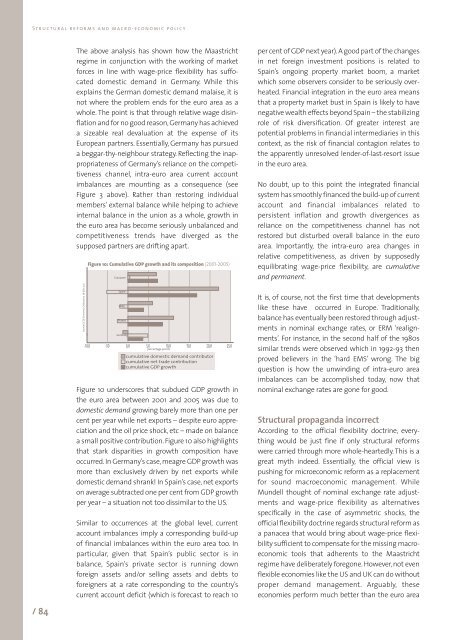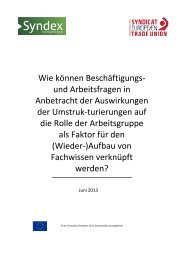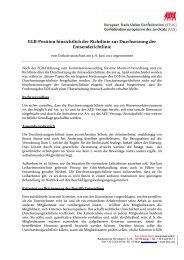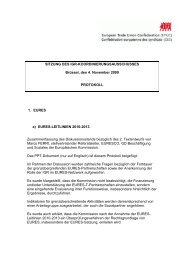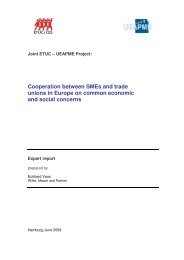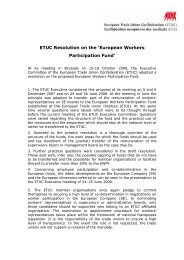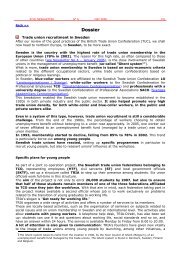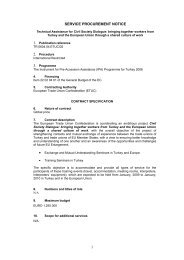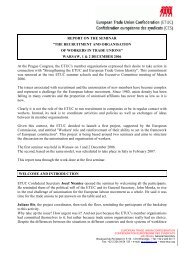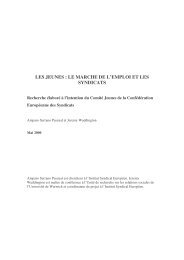Structural reforms and macro-economic policy - ETUC
Structural reforms and macro-economic policy - ETUC
Structural reforms and macro-economic policy - ETUC
Create successful ePaper yourself
Turn your PDF publications into a flip-book with our unique Google optimized e-Paper software.
<strong>Structural</strong> <strong>reforms</strong> <strong>and</strong> <strong>macro</strong>-<strong>economic</strong> <strong>policy</strong><br />
/ 84<br />
The above analysis has shown how the Maastricht<br />
regime in conjunction with the working of market<br />
forces in line with wage-price flexibility has suffocated<br />
domestic dem<strong>and</strong> in Germany. While this<br />
explains the German domestic dem<strong>and</strong> malaise, it is<br />
not where the problem ends for the euro area as a<br />
whole. The point is that through relative wage disinflation<br />
<strong>and</strong> for no good reason, Germany has achieved<br />
a sizeable real devaluation at the expense of its<br />
European partners. Essentially, Germany has pursued<br />
a beggar-thy-neighbour strategy. Reflecting the inappropriateness<br />
of Germany’s reliance on the competitiveness<br />
channel, intra-euro area current account<br />
imbalances are mounting as a consequence (see<br />
Figure 3 above). Rather than restoring individual<br />
members’ external balance while helping to achieve<br />
internal balance in the union as a whole, growth in<br />
the euro area has become seriously unbalanced <strong>and</strong><br />
competitiveness trends have diverged as the<br />
supposed partners are drifting apart.<br />
Source OCDE Economic Outlook no. 78 (Dec 20)<br />
Figure 10: Cumulative GDP growth <strong>and</strong> its composition (2001-2005)<br />
Eurozone<br />
Spain<br />
Italy<br />
France<br />
Germany<br />
-10,0 -50 0,0 5,0 10,0 15,0 20,0 25,0<br />
percentage points<br />
cumulative domestic dem<strong>and</strong> contributor<br />
cumulative net trade contribution<br />
cumulative GDP growth<br />
Figure 10 underscores that subdued GDP growth in<br />
the euro area between 2001 <strong>and</strong> 2005 was due to<br />
domestic dem<strong>and</strong> growing barely more than one per<br />
cent per year while net exports – despite euro appreciation<br />
<strong>and</strong> the oil price shock, etc – made on balance<br />
a small positive contribution. Figure 10 also highlights<br />
that stark disparities in growth composition have<br />
occurred. In Germany’s case, meagre GDP growth was<br />
more than exclusively driven by net exports while<br />
domestic dem<strong>and</strong> shrank! In Spain’s case, net exports<br />
on average subtracted one per cent from GDP growth<br />
per year – a situation not too dissimilar to the US.<br />
Similar to occurrences at the global level, current<br />
account imbalances imply a corresponding build-up<br />
of financial imbalances within the euro area too. In<br />
particular, given that Spain’s public sector is in<br />
balance, Spain’s private sector is running down<br />
foreign assets <strong>and</strong>/or selling assets <strong>and</strong> debts to<br />
foreigners at a rate corresponding to the country’s<br />
current account deficit (which is forecast to reach 10<br />
per cent of GDP next year). A good part of the changes<br />
in net foreign investment positions is related to<br />
Spain’s ongoing property market boom, a market<br />
which some observers consider to be seriously overheated.<br />
Financial integration in the euro area means<br />
that a property market bust in Spain is likely to have<br />
negative wealth effects beyond Spain – the stabilizing<br />
role of risk diversification. Of greater interest are<br />
potential problems in financial intermediaries in this<br />
context, as the risk of financial contagion relates to<br />
the apparently unresolved lender-of-last-resort issue<br />
in the euro area.<br />
No doubt, up to this point the integrated financial<br />
system has smoothly financed the build-up of current<br />
account <strong>and</strong> financial imbalances related to<br />
persistent inflation <strong>and</strong> growth divergences as<br />
reliance on the competitiveness channel has not<br />
restored but disturbed overall balance in the euro<br />
area. Importantly, the intra-euro area changes in<br />
relative competitiveness, as driven by supposedly<br />
equilibrating wage-price flexibility, are cumulative<br />
<strong>and</strong> permanent.<br />
It is, of course, not the first time that developments<br />
like these have occurred in Europe. Traditionally,<br />
balance has eventually been restored through adjustments<br />
in nominal exchange rates, or ERM ‘realignments’.<br />
For instance, in the second half of the 1980s<br />
similar trends were observed which in 1992-93 then<br />
proved believers in the ‘hard EMS’ wrong. The big<br />
question is how the unwinding of intra-euro area<br />
imbalances can be accomplished today, now that<br />
nominal exchange rates are gone for good.<br />
<strong>Structural</strong> propag<strong>and</strong>a incorrect<br />
According to the official flexibility doctrine, everything<br />
would be just fine if only structural <strong>reforms</strong><br />
were carried through more whole-heartedly. This is a<br />
great myth indeed. Essentially, the official view is<br />
pushing for micro<strong>economic</strong> reform as a replacement<br />
for sound <strong>macro</strong><strong>economic</strong> management. While<br />
Mundell thought of nominal exchange rate adjustments<br />
<strong>and</strong> wage-price flexibility as alternatives<br />
specifically in the case of asymmetric shocks, the<br />
official flexibility doctrine regards structural reform as<br />
a panacea that would bring about wage-price flexibility<br />
sufficient to compensate for the missing <strong>macro</strong><strong>economic</strong><br />
tools that adherents to the Maastricht<br />
regime have deliberately foregone. However, not even<br />
flexible economies like the US <strong>and</strong> UK can do without<br />
proper dem<strong>and</strong> management. Arguably, these<br />
economies perform much better than the euro area


